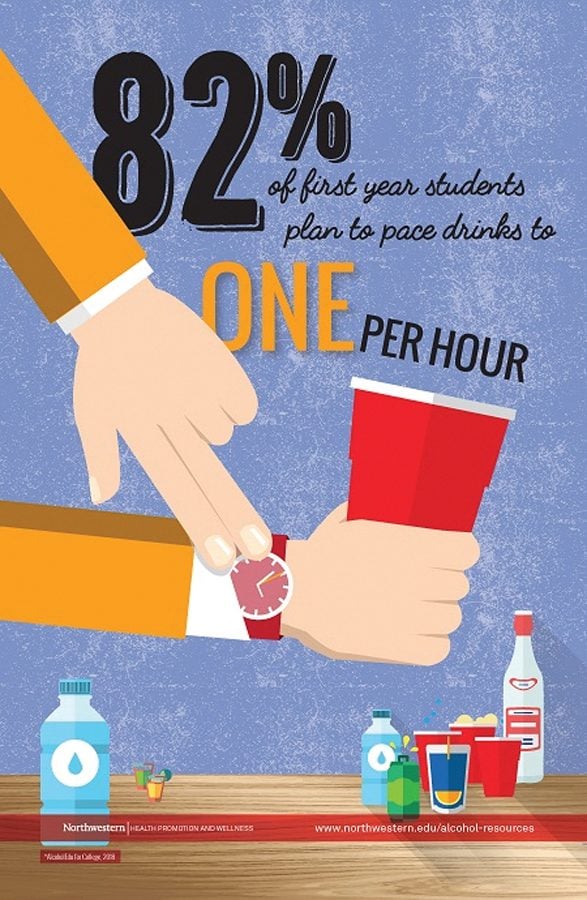NU Social Norms Campaign on alcohol, other drugs not effective, students say
A poster of the University’s Alcohol and Other Drug Social Norms Campaign. Some students say the campaign is ineffective in changing their behavior.
November 13, 2018
One in three first-year students chooses not to drink.
That’s according to surveys overseen by the Health Promotion and Wellness office, which posts colorful posters with phrases like this on the walls of residence halls and displayed on screens in dining halls.
Many students find the posters — part of the University’s Alcohol and Other Drug Social Norms Campaign — an ineffective way of reducing student alcohol and drug consumption. Some say the posters don’t change how they approach situations involving alcohol and drugs.
Resident Assistants put up the posters, which include statistics from the AlcoholEdu for College survey, in dorms at the beginning of each year, according to Kevin Meier, the assistant director of HPaW. After the results from the second segment of the survey are released in the winter, HPaW prints new posters, he said.
Meier said said some RAs take the first round of posters down before the second round is released, while others wait until the second round comes out to replace the originals.
This year’s campaign includes eight “messages” — statistics from the survey — but uses only four on printed posters. This is the campaign’s fourth year.
According to HPaW’s website, the campaign attempts to clarify misconceptions incoming students may have about alcohol and drugs at NU. Generally, social norms marketing campaigns at colleges aim to reduce student drinking and drug use by correcting their perceptions of their peers’ behaviors surrounding alcohol and drugs.
Medill freshman Katherine Gu said the posters get lost among all the other papers people put up around campus.
“I don’t think these posters are that conspicuous, so I don’t really pay that much attention to them,” Gu said.
Helen Radoff, a Weinberg freshman, said many of her peers glanced at the posters at the beginning of the year but don’t think much about them anymore.
“They don’t really have an impact on how I think about anything. They’re just kind of something that is there,” Radoff said. “I don’t think they’re genuinely going to make people really evaluate their decisions.”
On the other hand, Medill sophomore Jacob Muñoz thought the posters could be reassuring for incoming first-years who aren’t sure if they want to drink in college, although he wasn’t sure how effective they actually are.
Weinberg sophomore Margot Ricketts believes the posters are less effective because it can be unclear where the statistics come from — though they include source information at the bottom of the graphic, Ricketts was personally unaware they were from the AlcoholEdu survey.
Gu said the alcohol and others drugs True Northwestern Dialogue (TND) that incoming students are required to attend is a good way to reach a large group of students and provide relevant information about alcohol.
Radoff believes that for the most part, students at NU don’t feel pressured to drink if they don’t want to, and that it is more important for the administration to promote safe drinking like staying with others.
“The TND, with the AlcoholEdu, I feel like that was a good way for people to understand that they can do what they want. But make sure they’re doing it in a safe and informed way,” Radoff said.
Muñoz said there’s not much NU can do as an institution to reduce drinking beyond the initiatives the school takes already.
“Students who want to know more about if their drinking habits or their non-drinking habits are acceptable on campus, it’s something they have to discuss with other students,” Muñoz said. “You learn much more from interacting with your peers and people that you come to trust and know over time than any poster could tell you.”
Email: [email protected]
Twitter: @susannarkemp












